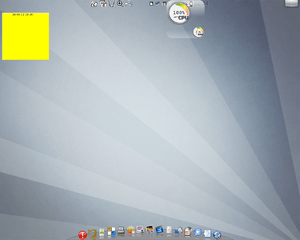Ututo
 | |
 | |
| Developer | The Ututo Team |
|---|---|
| OS family | Unix-like |
| Working state | Dormant |
| Initial release | 16 October 2000 |
| Latest release | XS 2012 / 27 April 2012 |
| Latest preview | Candidato-Ututo-2017-UL.iso[1] |
| Update method | ututo-get, using ebuilds from Gentoo |
| Package manager | ututo-get |
| Platforms | IA-32, x86-64; different repositories and optimizations for atom, duron-athlon, k8, pentium3, pentium4, nocona |
| Kernel type | Monolithic (Linux, FreeBSD) |
| Userland | GNU |
| Default user interface | GNOME, KDE, Xfce |
| License | Exclusively free licenses per GNU Free System Distribution Guidelines (GNU FSDG)[2] |
| Official website |
ututo |
Ututo is a Linux distribution consisting entirely of free software. The distribution is named for a variety of gecko found in northern Argentina.[3]
Ututo was the first fully free Linux-based system recognized by the GNU Project.[4][5] The founder of the GNU Project, Richard Stallman, formerly endorsed the distribution nearly exclusively,[6][7][8][9] and used it on his personal computer,[10] before he switched to gNewSense, and later Trisquel.
History
Ututo was first released in 2000 by Diego Saravia in National University of Salta. Argentina. It was one of the first live CD distributions in the world and the first Linux distribution in Argentina. Ututo carried Simusol,[11] a system to simulate Solar Energy projects. Ututo was simple to install, because it did not need any configuration. It automatically detected the hardware in the machine, it only asked to "move your mouse". At that time no other distribution worked that way.[12][13][14]
In 2002, Ututo-R was created, which offered the possibility of operating like a software router. This version was created by Marcos Zapata and used in Buenos Aires public schools.[15][16]
In 2004, the Ututo-e project was born, swiftly becoming the most important derivative of Ututo.[17] This project was started by Daniel Olivera.
In 2006, Ututo was declared "of National Interest" by the Argentine Chamber of Deputies.[18][19]
Ututo XS
Ututo XS is the current stable version of Ututo.
Ututo XS is compiled using Gentoo Linux ebuilds and emerge software. All documentation is in Spanish.
With the emergence of the XS series, many new features were added, including a faster system installer.[20][21][22] Ututo has been used in different hardware projects such as iFreeTablet.[23] Pablo Manuel Rizzo designed the package management system, Ututo-Get, modelled after Debian's APT;[24] however, as other Gentoo-based distros, Ututo is compatible with Portage.
Ututo has different binaries optimized for different Intel and AMD processors .[25]
With no releases since 2012 the distribution is considered "dormant".[26]
Ututo UL
Ututo UL (or Ubuntu-Libre) is the current developed version of Ututo. Ututo UL utilize Ubuntu as the distro base, with all nonfree software removed as usual in the Ututo project, and Linux-libre as the kernel.
In 2017 the original idea of distributing Simusol, a system to simulate Solar Energy projects, returned to the heart of the project.[1][27]
See also
- Comparison of Linux distributions
- GNU/Linux naming controversy
- List of Linux distributions based on Gentoo
- List of 3rd-party Linux distributions based on Ubuntu
References
- 1 2 "Index of /downloads". ututo.org. Retrieved 1 February 2017.
- ↑ "List of Free GNU/Linux Distributions- GNU Project - Free Software Foundation". gnu.org. Retrieved 30 April 2016.
- ↑ "Investigadores atraparán 10 "Ututos"".
- ↑ "List of Free GNU/Linux Distributions".
- ↑ Andrews, Jeremy (4 January 2005). "Interview: Richard Stallman, Kernel Trap". Archived from the original on 20 January 2012.
- ↑ "Ututo-e: "The only free distribution" revisited".
- ↑ "Superuser - Richard Stallman". 2006. Archived from the original on 15 February 2008.
- ↑ "Stallman recommends Ututo XS in LatinoWare 2007".
- ↑ "Explaining Why We Don't Endorse Other Systems, GNU Project, 2009.".
- ↑ Guglielmetti, Marcos (2006). "Ututo: el sistema que usa Richard Stallman".
- ↑ "SimuSol - Que es SimuSol". Retrieved 28 May 2013.
- ↑ "Ututo, el linux argentino". 2001.
- ↑ "INTERNET: Reportaje a Diego Saravia creador del Novedoso Ututo, de la Universidad Nacional de Salta". Clarín newspaper. 2001.
- ↑ "Argentina Embraces the Penguin". Wired magazine. 2001.
- ↑ Cassia, Fernando (15 June 2003). "Linux penguin dances tango in schools".
- ↑ "Ya van 11 escuelas de Buenos Aires con UtutoR (Reporte)".
- ↑ "Nueva distribución GNU/Linux totalmente libre: UTUTO-e".
- ↑ "DECLARAR DE INTERES DE LA H CAMARA EL "Proyecto Social de desarrollo e incorporación de Tecnología Informática basada en Software Libre denominado UTUTO"".
- ↑ "Software Libre : Proyecto UTUTO Declarado de Interés Nacional". Archived from the original on 31 July 2007.
- ↑ "Ututo XS liberado".
- ↑ "Ututo: Software Libre desde Argentina para el Mundo".
- ↑ ""UTUTO", EL SOFTWARE LIBRE ARGENTINO. Libertad, igualdad, fraternidad".
- ↑ Penalva, Javier (2 February 2010). "iFreeTablet, la tableta para el hogar digital made in Spain". Xataka. Retrieved 28 May 2013.
- ↑ "Ututo XS 2007".
- ↑ Byfield, Bruce (2005). "Review: Ututo-e, the "only free distribution"".
- ↑ DistroWatch. "DistroWatch.com: UTUTO". distrowatch.com. Retrieved 30 April 2016.
- ↑ Saravia, Diego. "Ututo–Home". ututo.org. Retrieved 1 February 2017.
External links
| Wikimedia Commons has media related to Ututo. |
- Official website
- A review of Ututo-e by Linux.com
- Richard Stallman talking about Ututo
- Ututo at DistroWatch